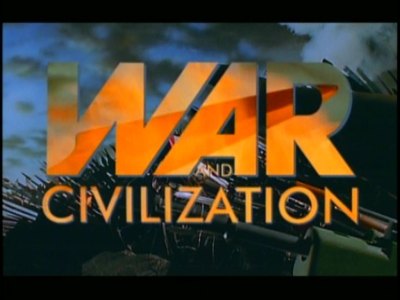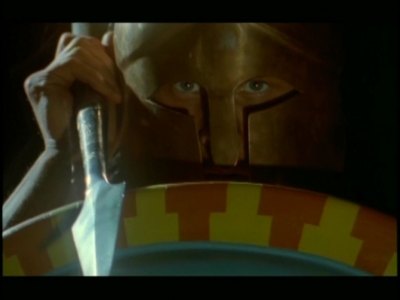| Reviews & Columns |
|
Reviews DVD TV on DVD Blu-ray 4K UHD International DVDs In Theaters Reviews by Studio Video Games Features Collector Series DVDs Easter Egg Database Interviews DVD Talk Radio Feature Articles Columns Anime Talk DVD Savant Horror DVDs The M.O.D. Squad Art House HD Talk Silent DVD
|
DVD Talk Forum |
|
|
| Resources |
|
DVD Price Search Customer Service #'s RCE Info Links |
|
Columns
|
|
|
War & Civilization - Hosted By Walter Cronkite
The Learning Channel and Koch Vision have released their eight-part 1998 documentary series, War and Civilization, narrated by Walter Cronkite, that tries to take on no less than explaining the origins of war and chronicling major engagements throughout a 3,000 year period of time. Based on the works of military historian John Keegan (who is interviewed throughout the series), War and Civilization doesn't look too terribly different than other History Channel, Military Channel, or A & E productions, with the standard emphasis put on historical recreations, newsreel and vintage documentary footage, authentic battle footage, as well as contemporary visits to the sites of the various battles.

Starting at the very beginning, War and Civilization traces the first "wars" - native tribes hurling insults at each other before one side draws "first blood" - and grounds them in the motive of "theft" (one tribe having a material or food that is coveted by another). Differing politics and religious beliefs then become instigators of war, as the series moves on, through the Greek wars where the superior "Western way of waging war," was invented (with its deadly decisiveness, disputes were ultimately settled) through the Roman and Chinese empires, the Asian battles involving Genghis Khan and Attila the Hun, the fall of Constantinople, the Aztecs, European conflicts such as the Seven Years War, the American Revolution, the Crimean War, the American Civil War, World War II, the Cold War, Korea, Vietnam, the first Gulf War, and right up to the then-current wars in Kosovo and Bosnia. It's an incredibly ambitious reach, with all the pluses and minuses associated with such an attempt.
On the plus side, such a sweeping overview does give the average viewer an immersion in the subject matter, with discernable progressions in the discussion, that accomplishes quite a bit more than a typical viewer perusing multiple tomes in search of the same kind of generalized, threaded account. As well, War and Civilization looks good, with shooting locations from all over the world, competently handled battle recreations (although some of the clips taken from Hollywood films looked a little silly), and nicely integrated moments from Keegan speaking about each particular engagement. The minus factor is fairly obvious: generalization. These aren't in-depth discussions. A surprising amount of info is related to the viewer, in an entertaining fashion, but in no way should each individual segment be considered more than just a starting point for further inquiry. As well, you had better be a fan of Walter Cronkite's distinctive delivery (I'm not); he talks for seven hours and if you're immune to the celebrated newsreader's ponderous, lugubrious charms, you may find yourself wishing that War and Civilization had found another narrator.
I've been a fan of John Keegan's work for some time now (he's written some amazing pieces on the Iraq War for The National Review Online), and his no-nonsense, penetrating views on war and its uses and limitations, are particularly cogent. Those viewers more comfortable with the middle-of-the-road to left-of-center bents of quite a few war documentaries that show up on cable, may be surprised at some of Keegan's assessments here in War and Civilization. For example: Keegan's belief that regardless of the actual outcome of the Vietnam War, it was, geopolitically, a victory for the United States over the Soviet Union's Cold War. That's a viewpoint you won't find expressed too often in the media. At one point during the discussion of Vietnam, Cronkite the narrator intones: "And back home in Washington the political will to win at all costs wasn't unanimous; the resulting confusion had an effect on the battlefield." This moment is supremely ironic, not only because Cronkite was a huge contributing factor to that growing perception that the Vietnam war was "unwinnable," but because this statement has such obvious parallels to today's political climate. You'll find many such moments of contemporary parallel situations in War and Civilization, a well-produced, balanced view of mankind's insatiable, never-changing need to wage war.

Here are the 8, 52-minute episodes of the three-disc documentary, War and Civilization:
First Blood
The origins of war are explored, culminating in the Greek phalanx technique, as well as examinations of Philip of Macedonia and Alexander the Great's campaigns.
Empires and Armies
Detailed looks at the Roman Empire and their advanced method of warfare, as well as the various Chinese empires and their bloody wars of attrition.
Horse Warriors
The introduction of the horse to war explodes the boundaries of where a war can be fought, and military geniuses Attila the Hun and Genghis Khan take full advantage of this powerful new weapon.
Gunpowder
With the invention and subsequent widespread use of gunpowder, primitive weapons such as swords, pikes, and shields soon became obsolete. As well, the fall of Constantinople is examined here, with the use of cannon instrumental in bringing down the city and bringing to an end the Middle Ages.
Revolution
The civilian revolutions of the 18th and 19th century are looked at, with special emphasis on the American and French Revolutions.
Blood and Iron
Industrialization in the West drastically changes the nature of war, creating far more deadly, efficient weaponry to be used against man. The American Civil War and the Crimean conflict are examined here.
War Machines
With the end of the horse-drawn era comes the mechanized modern army, resulting in the ability to wage war simultaneously across the globe. World War II is looked at in depth here.
The Price of War
The aftermaths of WWII are examined, as wars become smaller and more intense. Genocide and nationalism as excuses for war are examined.

The DVD:
The Video:
The letterboxed, 1:66:1 non-anamorphic video image for War and Civilization is adequate, but it's apparent that no clean-up has been done on this almost ten-year-old documentary. There's video noise and compression issues, along with faded colors and an at-times soft picture.
The Audio:
The Dolby Digital English mono audio track accurately reflects the original broadcast presentation. There are no subtitles or close-captions.
The Extras:
There are no extras for War and Civilization.
Final Thoughts:
Generalized to be sure, but War and Civilization's global, generational sweep admirably attempts to ground the viewer in the very origins of war, while covering in an entertaining fashion, most of the major conflicts of the last 3,000 years. The presence of John Keegan's insight is most welcome, with War and Civilization coming off as a more-than-competent examination of an unwieldy subject. I recommend War and Civilization for military and history buffs.
Paul Mavis is an internationally published film and television historian, a member of the Online Film Critics Society, and the author of The Espionage Filmography.


|
| Popular Reviews |
| Sponsored Links |
|
|
| Sponsored Links |
|
|
| Release List | Reviews | Shop | Newsletter | Forum | DVD Giveaways | Blu-Ray | Advertise |
|
Copyright 2024 DVDTalk.com All Rights Reserved. Legal Info, Privacy Policy, Terms of Use,
Manage Preferences,
Your Privacy Choices | |||||||














